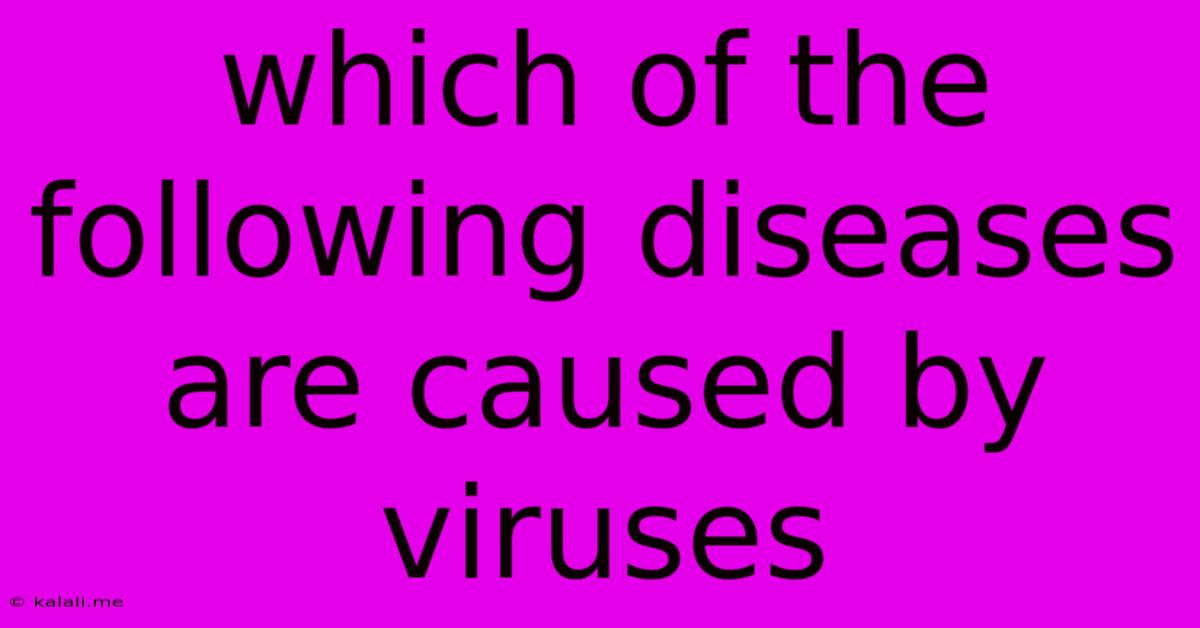Which Of The Following Diseases Are Caused By Viruses
Kalali
Jun 13, 2025 · 3 min read

Table of Contents
Which of the Following Diseases Are Caused by Viruses? A Comprehensive Guide
Viruses are microscopic infectious agents that can only replicate inside the cells of a living organism. They are responsible for a vast array of diseases, impacting everything from the common cold to more serious illnesses. This article will explore several common diseases and determine which are caused by viruses. Understanding viral diseases is crucial for effective prevention and treatment. We'll delve into the specifics of viral infections and what sets them apart from other types of illnesses.
What are Viruses?
Before we dive into specific diseases, it's important to understand the nature of viruses. Unlike bacteria, which are self-sufficient organisms, viruses are essentially genetic material (DNA or RNA) encased in a protein coat. They lack the cellular machinery to reproduce independently and must hijack the cellular processes of a host cell to replicate. This parasitic nature is a defining characteristic of viruses.
Viral Diseases: A Closer Look
Many diseases we encounter daily are caused by viruses. Let's explore some examples, categorized for clarity:
Respiratory Infections:
-
Influenza (Flu): The flu is a highly contagious respiratory illness caused by influenza viruses. Symptoms include fever, cough, sore throat, muscle aches, and fatigue. Seasonal flu vaccines are available to help prevent infection. Different strains of influenza viruses emerge regularly, necessitating updates to the vaccine.
-
Common Cold: Rhinoviruses are the most common culprits behind the common cold. These viruses cause a range of symptoms, including runny nose, sneezing, sore throat, and cough. While there's no cure, most colds resolve within a week or two.
-
Respiratory Syncytial Virus (RSV): RSV is a common virus that usually causes mild, cold-like symptoms. However, it can be serious for infants and older adults, potentially leading to pneumonia or bronchiolitis.
-
COVID-19: Caused by the SARS-CoV-2 virus, COVID-19 is a respiratory illness that can range in severity from mild symptoms to severe pneumonia and even death. Vaccines and antiviral treatments are available to combat the virus.
Gastrointestinal Infections:
-
Rotavirus: Rotavirus is a major cause of diarrheal illness in infants and young children worldwide. Vaccination significantly reduces the incidence and severity of rotavirus infections.
-
Norovirus: Norovirus, also known as the "winter vomiting bug," causes acute gastroenteritis with vomiting and diarrhea. It's highly contagious and spreads easily through contaminated food or surfaces.
Other Viral Diseases:
-
Measles: Measles is a highly contagious disease caused by the measles virus. Symptoms include fever, cough, runny nose, and a characteristic rash. Vaccination is highly effective in preventing measles.
-
Mumps: The mumps virus causes swelling of the salivary glands. Like measles, vaccination is crucial for prevention.
-
Rubella (German Measles): Rubella is a mild viral illness, but infection during pregnancy can lead to serious birth defects. Vaccination is highly recommended.
-
Chickenpox (Varicella): Chickenpox is a highly contagious disease characterized by an itchy rash with blisters. A vaccine is available and highly effective.
-
Herpes Simplex Virus (HSV): HSV-1 commonly causes oral herpes (cold sores), while HSV-2 often causes genital herpes. These viruses can cause recurrent infections.
-
Human Immunodeficiency Virus (HIV): HIV is a retrovirus that attacks the immune system, leading to acquired immunodeficiency syndrome (AIDS) if left untreated. Antiretroviral therapy (ART) significantly improves the lives of people living with HIV.
-
Human Papillomavirus (HPV): HPV is a group of viruses that can cause warts and certain types of cancer. Vaccines are available to prevent infection with high-risk HPV types.
-
Hepatitis A, B, and C: These viruses cause inflammation of the liver. Hepatitis A and B have vaccines, while Hepatitis C does not currently have a vaccine.
This list is not exhaustive, but it provides a broad overview of common viral diseases. It's vital to remember that early diagnosis and appropriate treatment are crucial for managing viral illnesses effectively. Consult a healthcare professional for accurate diagnosis and treatment options for any suspected viral infection. Always practice good hygiene, such as handwashing, to minimize your risk of contracting viral diseases. Vaccination remains a cornerstone of preventing many serious viral infections.
Latest Posts
Latest Posts
-
Which Of The Following Is A Meristematic Tissue
Jun 14, 2025
-
Are Special Purpose Printers That Use Output
Jun 14, 2025
-
Which Of The Following Is An Example Of A Browser
Jun 14, 2025
-
Which Number Is A Multiple Of 6
Jun 14, 2025
-
Work Done By The Gravitational Force
Jun 14, 2025
Related Post
Thank you for visiting our website which covers about Which Of The Following Diseases Are Caused By Viruses . We hope the information provided has been useful to you. Feel free to contact us if you have any questions or need further assistance. See you next time and don't miss to bookmark.